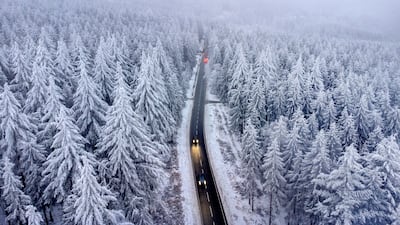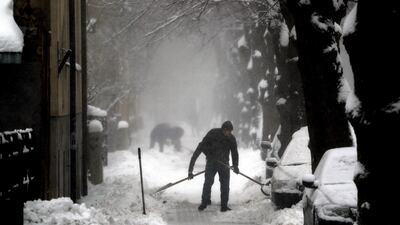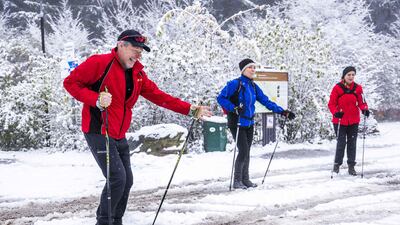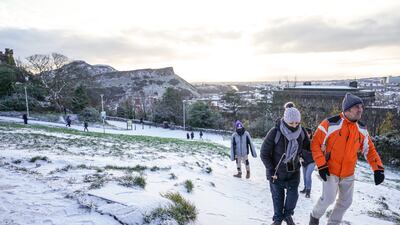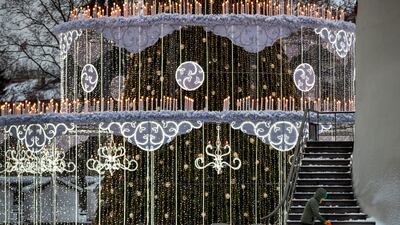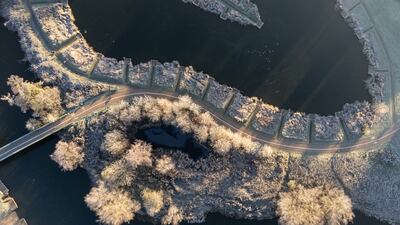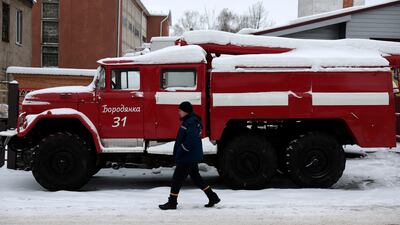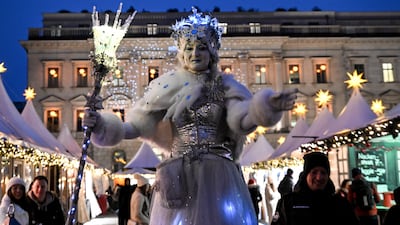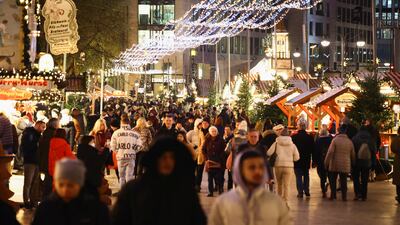The Germans have a word for when the sun goes down and the wind is still: Dunkelflaute, or dark lull.
The enemy of wind and solar power, it is the latest obstacle in Europe’s path as it tries to deal with a winter energy crisis.
The “dark doldrums”, as the word is sometimes translated, are about to arrive in earnest.
Germany’s northern tip, the North Sea island of Sylt, will soon have as few as seven hours and 11 minutes of sunlight a day.
As cold polar air descends on Europe, it will be the most severe test yet of how the continent copes with little Russian gas.
With temperatures 0.7ºC colder than average in recent days, Germany missed its 20 per cent gas savings target for the first time in weeks.
Some in Germany are unhappy that the country is entering the valley of darkness with only a minimal nuclear power reserve.
“The current Dunkelflaute throws a harsh light on the failed energy policy of green-left ideologues,” raged one far-right MP, Steffen Kotre.
Yet nuclear-loving France is also vulnerable after a troubled year in which corrosion forced it to shut down many reactors.
Every time the temperature drops 1ºC, France needs an energy boost equal to that provided by two nuclear reactors, the power grid operator says.
“A winter of extreme cold and an absence of wind would lead to a catastrophic scenario,” it said.
Power cuts are not being ruled out and an app will give users an “electricity weather forecast” to show whether the grid is under strain.
At least one French factory is embracing the darkness, telling employees to work at night when the risk of the grid being overloaded is lower.
“The French government’s been very frank about this, talking about the possibility of power cuts,” said Paul Smith, a French politics expert at the University of Nottingham.
“It’s quite an interesting contrast to the UK.”

UK ministers have played down the prospect of power cuts and have largely refrained from telling people to save power.
Prime Minister Rishi Sunak announced Britain would buy more liquefied natural gas from the US as part of a closer energy partnership.
One thing Britain is doing is offering incentives for people to move their electricity use outside peak times.
People coming home from work could be encouraged to delay using washing machines, dishwashers and showers until after 9pm.
Without those savings, Britain could face cuts in a scenario where a Dunkelflaute coincides with reduced imports through interconnectors with France, Belgium, the Netherlands and Ireland.
While wind can generate more than half of Britain’s electricity on a blustery day, it can be under 10 per cent in calm conditions.
“On days when it was cold with low levels of wind, there is the potential to need to interrupt supply to some customers for limited periods of time in a managed and controlled manner,” National Grid operators have said.
Germany is also combining its weather and energy forecasts.
The next few days are considered critical because temperatures are tipped to drop 2ºC lower than usual.
The sharp rise in gas use could amount to 18 per cent of Germany’s storage capacity, putting a dent in rations so carefully saved for winter.
Business leaders who spoke to The National in northern Germany fear another damaging winter after two years of coronavirus restrictions.
Experts are running clinics to give people household tips, while the plug has been pulled on comforts from escalators to Christmas lights in a push to save energy
A YouGov poll found that one in 10 Germans made it to the end of November without turning on the heating at home.
Another tip from experts is to focus on warming the body rather than empty space.
“There’s no need to heat a whole house or room,” is the advice of medical professors Mike Tipton and Hugh Montgomery.
“You’re much better off heating yourself up and it starts with making sure you’re wearing appropriate clothing.”
Germany prepares for the Christmas period — in pictures
In Germany's worst-case scenario, the government would have to step in and ration energy, with households asked to give up luxuries.
But there was good news when Germany completed a new gas terminal after only six months of construction.
An Economy Ministry spokesman said that Germany was prepared for a coming Dunkelflaute.
“It’s simply a fact that the sun shines less in winter and a lack of wind is no surprise,” he said. “These conditions are provided for.
“If the north or the south contributes less for a time because of a lack of sunshine, then other capacity will jump in as planned.”
These problems will not go away automatically when winter turns to spring.
A report handed to French security officials this week said gaps in supply could grow to 40 per cent of European demand by 2025.
It said a lack of “clarity, organisation and audacity” had stalled progress on green initiatives that could compensate for the lack of gas.
“If Europe does not decarbonise voluntarily to preserve our climate, it risks having to do so by force because of chronic constraints on its access to fossil fuels,” said the report, commissioned by the French Defence Ministry.
Pieter de Pous, an adviser for climate think tank E3G, said Germany was only now emerging from a decade of feeble renewable growth.
“That means they’re in a really tight spot now and had to put 10 gigawatts of coal plants back online unexpectedly,” Mr de Pous said.
“Of course, that is making it harder for them to meet their energy goals now.”
Another study, by McKinsey, said Germany would probably have to rely on gas for at least another decade.
It said electricity costs might not be back at tolerable levels until 2025, and that part of the answer was better battery storage for when the Sun was not playing ball.
But Europe’s push to exploit what sunshine it has is not made easier by China’s dominance of the market and vast subsidies for US manufacturing.
“While Germany received 55 per cent of its gas from Russia in 2021, it currently gets 95 per cent of its solar cells directly or indirectly from China,” the McKinsey report said.
“The reconstruction of at least a European photovoltaic industry looks like a necessary option.”
